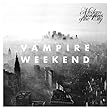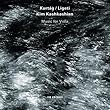 Vampire Weekend’s Contra is personable, intimate; exuberant, yet cool: a very particular sensibility: singer and principal lyricist Ezra Koenig, pianist and guitarist (really, multi-instrumentalist) Rostam Batmanglij, drummer Christopher Tomson, and bassist Chris Baio. Modern Vampires of the City has a great sense of drive and energy—even passion.
Vampire Weekend’s Contra is personable, intimate; exuberant, yet cool: a very particular sensibility: singer and principal lyricist Ezra Koenig, pianist and guitarist (really, multi-instrumentalist) Rostam Batmanglij, drummer Christopher Tomson, and bassist Chris Baio. Modern Vampires of the City has a great sense of drive and energy—even passion.
Author:
Tradition Honored and Refreshed: Cecile McLorin Salvant, WomanChild
 Great things are expected of Cecile McLorin Salvant, a singer and songwriter, and the winner of the Thelonious Monk Jazz Competition; and on WomanChild, accompanied by pianist Aaron Diehl, drummer Herlin Riley, bassist Rodney Whitaker, and guitarist James Chirillo, Cecile McLorin Salvant has begun to prove that faith deserved.
Great things are expected of Cecile McLorin Salvant, a singer and songwriter, and the winner of the Thelonious Monk Jazz Competition; and on WomanChild, accompanied by pianist Aaron Diehl, drummer Herlin Riley, bassist Rodney Whitaker, and guitarist James Chirillo, Cecile McLorin Salvant has begun to prove that faith deserved.
Familiar Pleasures: Kermit Ruffins, We Partyin’ Traditional Style
 Brassily boisterous, pleasantly cluttered with a fragmented, fast rhythm is Kermit Ruffins’ own “Treme Second Line” and Ruffins’ rough delivery, half-spoken/half-sung, is a unique acquired taste. “Over the Waves” is a somewhat mournful instrumental sound; and yet its old-fashioned quality gives it a kind of wit that is confirmed when the rhythm quickens (its shifting structure makes this one of the most appealing pieces on the recording We Partyin’ Traditional Style). “All of Me” has a muted trumpet introduction, joined by a high female voice echoing Billie Holiday’s (singer Mykia Jovan), before Ruffin joins in for a duet. ‘Marie” is an uptempo seduction song, not particularly persuasive. “When the Saints Go Marching In” is joyfully brassy.
Brassily boisterous, pleasantly cluttered with a fragmented, fast rhythm is Kermit Ruffins’ own “Treme Second Line” and Ruffins’ rough delivery, half-spoken/half-sung, is a unique acquired taste. “Over the Waves” is a somewhat mournful instrumental sound; and yet its old-fashioned quality gives it a kind of wit that is confirmed when the rhythm quickens (its shifting structure makes this one of the most appealing pieces on the recording We Partyin’ Traditional Style). “All of Me” has a muted trumpet introduction, joined by a high female voice echoing Billie Holiday’s (singer Mykia Jovan), before Ruffin joins in for a duet. ‘Marie” is an uptempo seduction song, not particularly persuasive. “When the Saints Go Marching In” is joyfully brassy.
A Talent, Disciplined and Wild: Youn Sun Nah, Lento
 The singer’s control as she accompanies the rhythm is exceptional. “Soundless Bye” is a ballad of equal quality to what comes before; and “Full Circle,” by Vincent Peirani and Youn Sun Nah, offers wordplay. A Korean tune written by Chun S. Park is offered. “Ghost Riders in the Sky,” a Stan Jones narrative of cowboy adventure, is forcefully sung; and a supernatural warning comes on the western plain. “Waiting,” by Lars Danielsson and Cæcilie Norby, is one of the few Lento songs that sound like established jazz (much of the music of Youn Sun Nah could be considered art songs or a high grade of traditional popular music).
The singer’s control as she accompanies the rhythm is exceptional. “Soundless Bye” is a ballad of equal quality to what comes before; and “Full Circle,” by Vincent Peirani and Youn Sun Nah, offers wordplay. A Korean tune written by Chun S. Park is offered. “Ghost Riders in the Sky,” a Stan Jones narrative of cowboy adventure, is forcefully sung; and a supernatural warning comes on the western plain. “Waiting,” by Lars Danielsson and Cæcilie Norby, is one of the few Lento songs that sound like established jazz (much of the music of Youn Sun Nah could be considered art songs or a high grade of traditional popular music).
Theatricality and Truth: Audra McDonald, Go Back Home
 On Audra McDonald’s Go Back Home, Adam Guettel’s “Migratory V” has exultant, pretty tones, with lyrics that suggest a large perspective, with glimpses of nature and spirituality. What is the source of the dramatized feeling in the person? Men see women differently after sex, the lyrics of “Virtue” note: men change the state of women then judge the state. It is a short reflective commentary. Female morality is judged differently (loving or cruel), depending on whether or not a man benefits from her choices.
On Audra McDonald’s Go Back Home, Adam Guettel’s “Migratory V” has exultant, pretty tones, with lyrics that suggest a large perspective, with glimpses of nature and spirituality. What is the source of the dramatized feeling in the person? Men see women differently after sex, the lyrics of “Virtue” note: men change the state of women then judge the state. It is a short reflective commentary. Female morality is judged differently (loving or cruel), depending on whether or not a man benefits from her choices.
The Harmony of Male Community: This Generation by The Lions
 There is a sense of male camaraderie in “Revelation,” and in the other songs, with harmonic and counter-posed male voices, a sense of distance, and the lack of the pretty or the subtle. Strongly instrumental is “New Girl,” featuring a horn—it has warmth, texture, even charm. “Pieces of a Man” is addressed to a woman; it is a romantic promise of care and fidelity, and has an inflection of soul music. Moody is “More/Higher Ways,” consisting of lyrics focused on the limits of current society—and the search for higher ideals and practices.
There is a sense of male camaraderie in “Revelation,” and in the other songs, with harmonic and counter-posed male voices, a sense of distance, and the lack of the pretty or the subtle. Strongly instrumental is “New Girl,” featuring a horn—it has warmth, texture, even charm. “Pieces of a Man” is addressed to a woman; it is a romantic promise of care and fidelity, and has an inflection of soul music. Moody is “More/Higher Ways,” consisting of lyrics focused on the limits of current society—and the search for higher ideals and practices.
Reflection, Remembrance, Rigor: Kim Kashkashian performs Kurtag & Ligeti – Music for Viola
 On Kurtag & Ligeti – Music for Viola, the solitary, solemn viola evokes a sense of isolation, possibly in a natural landscape (“In Nomine,” followed by “Silent Lines”). “Letter to Vera Ligeti” is light and slight; expressive is “For Imre Foldes at 60” and the fourth piece, “Chromatically saucy,” is short and dynamic, feeding easily into the next piece.
On Kurtag & Ligeti – Music for Viola, the solitary, solemn viola evokes a sense of isolation, possibly in a natural landscape (“In Nomine,” followed by “Silent Lines”). “Letter to Vera Ligeti” is light and slight; expressive is “For Imre Foldes at 60” and the fourth piece, “Chromatically saucy,” is short and dynamic, feeding easily into the next piece.
The Splendor of Southern Gold: Davell Crawford, My Gift to You
 On My Gift to You, with a softly carnivalesque sound for a song of personal and cultural history, “Creole Man” indicates diverse ancestry—African, Native American, etcetera. The sensitive voice of the singer Davell Crawford is greatly appealing. “River” is uptempo, textured funk; with a marvelous chorus, and the interpolations of Doctor John and Big Freedia and Donald Harrison Jr. It is true that Davell Crawford, a musician in sacred and secular music, and the grandson of singer-songwriter and trumpeter Sugar Boy Crawford, has performed with Ruth Brown and Anders Osborne; and Davell Crawford is also musical heir to men such as Professor Longhair and James Booker and Allen Toussaint, so celebration and tribute may be a natural inclination.
On My Gift to You, with a softly carnivalesque sound for a song of personal and cultural history, “Creole Man” indicates diverse ancestry—African, Native American, etcetera. The sensitive voice of the singer Davell Crawford is greatly appealing. “River” is uptempo, textured funk; with a marvelous chorus, and the interpolations of Doctor John and Big Freedia and Donald Harrison Jr. It is true that Davell Crawford, a musician in sacred and secular music, and the grandson of singer-songwriter and trumpeter Sugar Boy Crawford, has performed with Ruth Brown and Anders Osborne; and Davell Crawford is also musical heir to men such as Professor Longhair and James Booker and Allen Toussaint, so celebration and tribute may be a natural inclination.
The Passion and Precision of Poetry: Susanne Abbuehl, The Gift
 The flugelhorn produces an eerie effect, natural, old, strange. That flugelhorn is played by Matthieu Michel; and other musicians on The Gift include Wolfert Brederode on piano
The flugelhorn produces an eerie effect, natural, old, strange. That flugelhorn is played by Matthieu Michel; and other musicians on The Gift include Wolfert Brederode on piano
and harmonium, and Olavi Louhivuori on drums.
Voice and Piano of a Musical Messenger: Andy Bey, The World According to Andy Bey
 On The World According to Andy Bey, the songs assume a coherent, intelligent caring sensibility and subject, a world in which relationships matter—even if and when relationships are troubled. Love is seen as many things: infatuation, lust, compassion, faith, loyalty, understanding, care, dedication. Meaning is preferred to nihilism. Who or what brings knowledge and joy? What allows people to become themselves? We are encouraged to consider such questions.
On The World According to Andy Bey, the songs assume a coherent, intelligent caring sensibility and subject, a world in which relationships matter—even if and when relationships are troubled. Love is seen as many things: infatuation, lust, compassion, faith, loyalty, understanding, care, dedication. Meaning is preferred to nihilism. Who or what brings knowledge and joy? What allows people to become themselves? We are encouraged to consider such questions.